 Petzlover
Petzlover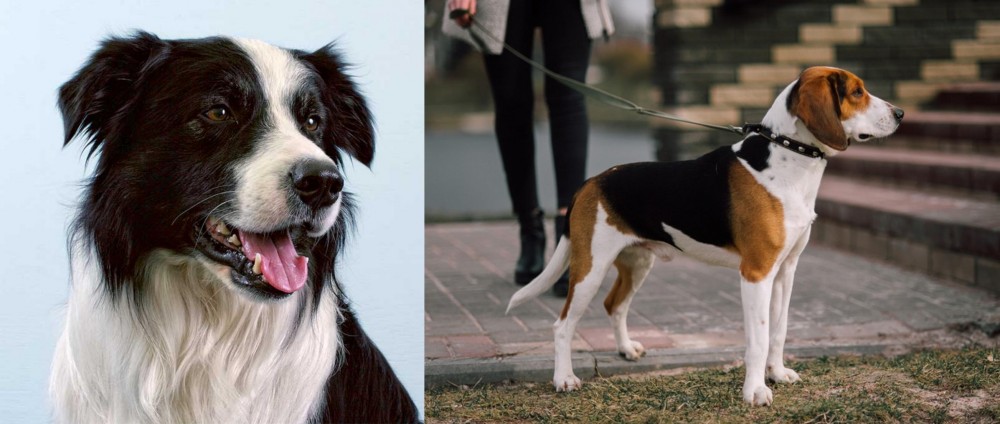 Border Collie is originated from United Kingdom but Estonian Hound is originated from Estonia. Both Border Collie and Estonian Hound are having almost same height. Both Border Collie and Estonian Hound are of same weight. Both Border Collie and Estonian Hound has almost same life span. Both Border Collie and Estonian Hound has same litter size. Both Border Collie and Estonian Hound requires Moderate Maintenance.
Border Collie is originated from United Kingdom but Estonian Hound is originated from Estonia. Both Border Collie and Estonian Hound are having almost same height. Both Border Collie and Estonian Hound are of same weight. Both Border Collie and Estonian Hound has almost same life span. Both Border Collie and Estonian Hound has same litter size. Both Border Collie and Estonian Hound requires Moderate Maintenance.
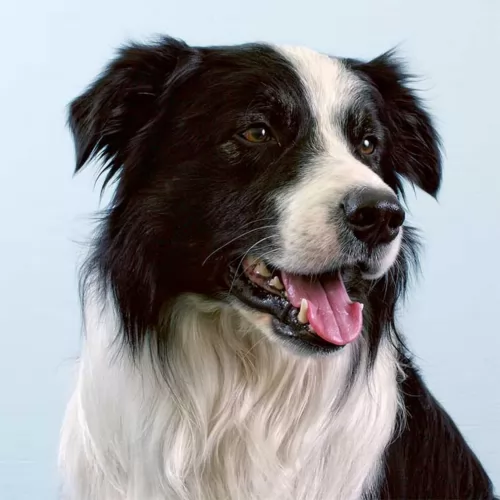 The Border Collie originated in Northumberland and was used to herd livestock. He is particularly well known for his intense stare in controlling the sheep in his care. The name Border Collier wasn’t used until 1915. This was so that the dog could be registered as a separate breed together with other Collie breeds already registered.
The Border Collie originated in Northumberland and was used to herd livestock. He is particularly well known for his intense stare in controlling the sheep in his care. The name Border Collier wasn’t used until 1915. This was so that the dog could be registered as a separate breed together with other Collie breeds already registered.
Sheepdog trials have been held since 1873. The very name of this dog gives you an inkling as to his heritage, as the word ‘Collie’ refers to sheepdogs and comes from Scottish dialect. Today the Border Collie is recognized as the ultimate sheep-herding dog, with his amazing intelligence and herding skills. The Border Collie was recognized by the American Kennel Club in October 1995.
 In 1947, the Estonian Hound was developed and remains today the only pure breed ever developed in Estonia. At that time the national economic minister of the Soviet Union declared that every country in the USSR must have a national dog breed. Thus, the Estonian Hound and the Estonian Kennel Union were born. The Kennel Union is currently seeking breed recognition from the Federation Cynoloqique Internationale.
In 1947, the Estonian Hound was developed and remains today the only pure breed ever developed in Estonia. At that time the national economic minister of the Soviet Union declared that every country in the USSR must have a national dog breed. Thus, the Estonian Hound and the Estonian Kennel Union were born. The Kennel Union is currently seeking breed recognition from the Federation Cynoloqique Internationale.
The Estonian Hound came from breeding local Estonian hunting dogs with several different breeds of foreign dogs. The Soviet decree also established that hunting dogs had to be no more than 17 inches high. This result in a hunting dog with great agility and drive that is extremely popular in now inependent Estonia. It is the national dog.
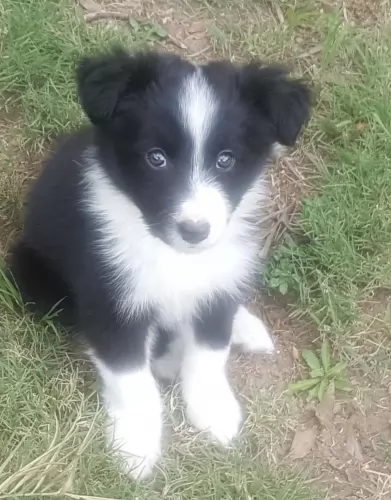 Utterly responsive, intelligent, alert and keen, the medium sized border collie loves nothing more than to be actively working. He requires both mental and physical stimulation. The ideal height for this very intelligent dog is 46 – 53cm and they weigh in at about 14 – 22kg.
Utterly responsive, intelligent, alert and keen, the medium sized border collie loves nothing more than to be actively working. He requires both mental and physical stimulation. The ideal height for this very intelligent dog is 46 – 53cm and they weigh in at about 14 – 22kg.
People who have been to sheepdog trials can only marvel a this dog and his intense stare, moving the sheep to precisely where his master wants them. The dog has a moderately long and smooth coat with a dense topcoat, with soft weather resistant undercoat. Most common color is black and white but other colors such as chocolate and white, liver and white or blue merle are also seen.
There are a few Border Collies which have a single-colour coat. He has a long feathery tail and the ears can be either erect, semi-erect and in some instances, even dropped. He has brown eyes but sometimes with the Merle Border Collie you can get one eye or part of the eye which is blue.
Border Collies are playful, energetic dogs who just love living in homes where the family involves him in all their activities. Because he is so intelligent, he is demanding of his human family, wanting them to take notice of him and provide him with lots of clever games and sports. If he is left without involvement, he can become frustrated and destructive. That is why it is so important to choose your pet carefully.
These highly energetic dogs require owners who recognize this need and are prepared to provide him with lots of games, walks and runs.
 The Estonian Hound is a strong, muscular body of medium size, with well-developed muscles and strong bones. It has a straight muzzle and skull with defined eyebrows and long drop ears. They have black noses and dark eyes. Their back is wide and straight, and their chest is deep and wide. They have skin that is tight with no wrinkles or folds anywhere.
The Estonian Hound is a strong, muscular body of medium size, with well-developed muscles and strong bones. It has a straight muzzle and skull with defined eyebrows and long drop ears. They have black noses and dark eyes. Their back is wide and straight, and their chest is deep and wide. They have skin that is tight with no wrinkles or folds anywhere.
The Estonian Hound is double coated, but the undercoat is not well developed. The top coat is rough, short and shiny. The tail has a thick covering of hair. The color is usually white with red patches, black or brown patches or yellow patches.
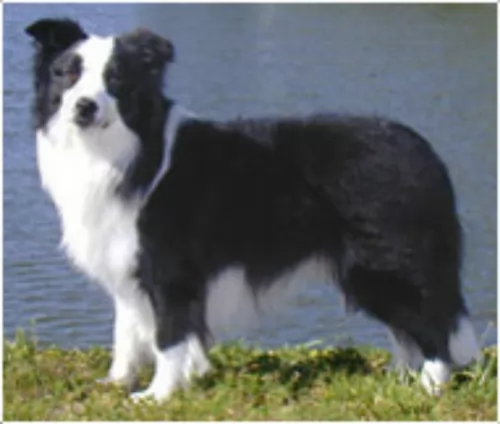 The Border Collie is such an awesome working dog breed, being of tremendous help to farmers. With their endless energy and stamina, given the chance he would want to be working all day. This medium sized dog will need a family where they are hard working and active just like him. He makes a wonderful pet with the right owners and if everyone is active in the family, he becomes your devoted soulmate.
The Border Collie is such an awesome working dog breed, being of tremendous help to farmers. With their endless energy and stamina, given the chance he would want to be working all day. This medium sized dog will need a family where they are hard working and active just like him. He makes a wonderful pet with the right owners and if everyone is active in the family, he becomes your devoted soulmate.
He is sensitive to what his owner wants and that is also because he is highly intelligent. Shower your wonderful pet with lots of love, give him lots of attention and plenty of activities, and you’ll have an awesome friend for life.
 The Estonian Hound is a happy dog and loves to play with children. He was bred to hunt though and he can get fixated on a scent and knock over a small child.
The Estonian Hound is a happy dog and loves to play with children. He was bred to hunt though and he can get fixated on a scent and knock over a small child.
He is a hunting dog with great agility and drive.
He has had to be adaptable through his short history and is now more a companion than a hunting dog. He can live in the city or country.
He is intelligent and trainable. He is lively and energetic and the challenge might be keeping his attention long enough to train.
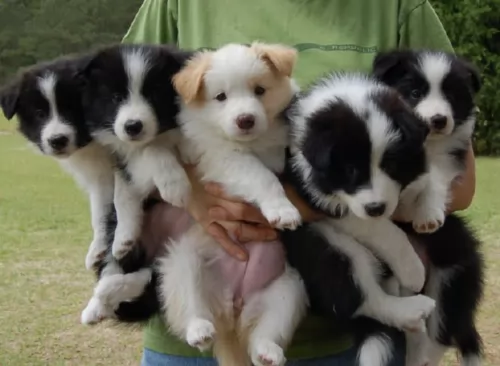 If your Border Collie is healthy, he can live to be 14 years of age and longer. There are one or two dog ailments that are more common in this breed, so it is wise to be aware of what can go wrong, although with good care it is highly unlikely.
If your Border Collie is healthy, he can live to be 14 years of age and longer. There are one or two dog ailments that are more common in this breed, so it is wise to be aware of what can go wrong, although with good care it is highly unlikely.
Primary epilepsy, known as idiopathic epilepsy can be seen in your dog before the age of 5 years, and although a genetic link in border collies has not yet been identified, idiopathic epilepsy is more prevalent in some breeds. Seizures in your dog are caused by electrical disturbances in the brain and treatment may be for life. While epilepsy in dogs can’t be cured, the condition can be managed with medication recommended by your vet and then he can lead a healthy life.
Collies are prone to developing hip dysplasia, which is an inherited condition with abnormal formation of the hip socket. For your pet it can mean lameness as well as painful arthritis. You’ll see your collie dog battling to rise after lying down. It is actually common in lots of dog breeds, but more so in larger breeds.
This is an inherited problem that can lead to your dog going blind. About 70 to 97% of collies in the UK and the United States are affected. Your veterinarian will examine your dog to determine the extent of the defect. It is common in the first year of a dog and can be be prevented if caught early.
 With such a young breed there have not been any studies done on their health or genetic issues. It seems the breed is fairly healthy but there is too little information to really say. Being confined to Estonia there has been little commercial or backyard breeding. He is less likely than most pure breeds to have genetic issues.
With such a young breed there have not been any studies done on their health or genetic issues. It seems the breed is fairly healthy but there is too little information to really say. Being confined to Estonia there has been little commercial or backyard breeding. He is less likely than most pure breeds to have genetic issues.
It is likely that dogs of his type are at risk for:
Caused by excessive exercise before or after having eaten a large meal. It is suggested that you feed your English Setter twice a day, smaller meals and not right before or after strenuous exercise.
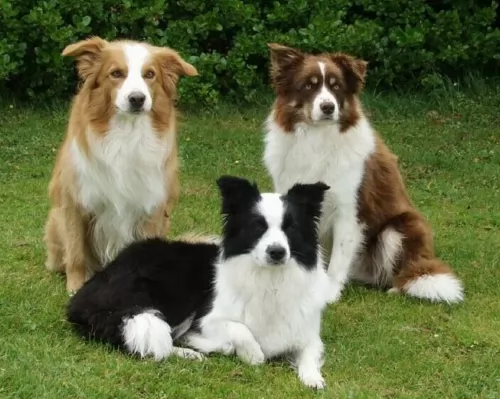 This is a dog that will need plenty of exercise and attention. He won’t do well cooped up in a tiny home. He’ll want lots of place to run and play and with his owners involved in his activities. It is unfair of any dog owner to buy a dog like this and then leave him so that he becomes distressed from being ignored.
This is a dog that will need plenty of exercise and attention. He won’t do well cooped up in a tiny home. He’ll want lots of place to run and play and with his owners involved in his activities. It is unfair of any dog owner to buy a dog like this and then leave him so that he becomes distressed from being ignored.
Do your dog a favor and see that he is socialized as a puppy and trained as he grows older. Once he has been trained, he becomes a super pet, obedient, sensitive and willing to please.
Border collies shed throughout the year, and with Summer his shedding becomes a bit more. He will require a good brushing at least twice a week to get rid of loose hairs and to ensure that the long hair doesn’t become tangled. He isn’t considered hypoallergenic and is regarded as a safe pet to have for people with allergies.
This high energy working dog will require top quality food from the top brands if you intend feeding him from commercially produced dog food. He will certainly need raw meat added to this food from time to time to ensure you stave off skin problems such as rashes. You can also add in rice, meat and vegetables for variety to ensure his is getting in all the minerals and vitamins he needs. Fresh, cool water should always be available to him day and night.
 Feed a high quality dry food made for puppies. Feed ¼ to ½ cup per day in 2-3 meals for the first six months.
Feed a high quality dry food made for puppies. Feed ¼ to ½ cup per day in 2-3 meals for the first six months.
Feed 1 to 2 cups in two meals from 6 months to a year or so.
Feed about 2 to 3 cups in two meals.
As previously mentioned this seems to be a fairly healthy breed.
Be careful not to feed a large meal before or after exercise due to possibility of bloat.
Check their ears and clean them periodically.
The Estonian Hound is a hunting dog and needs a good deal of exercise – at least an hour and a half every day or a long walk if not used for hunting. He is a working dog with a lot of energy and stamina. Don’t let him off leash though or he will follow his nose and take off. He is usually calm and quiet indoors if he gets enough physical and mental stimulation outdoors. He can be destructive and loud, nervous and hyper if he doesn’t. They enjoy Frisbee, agility, tracking and of course hunting.